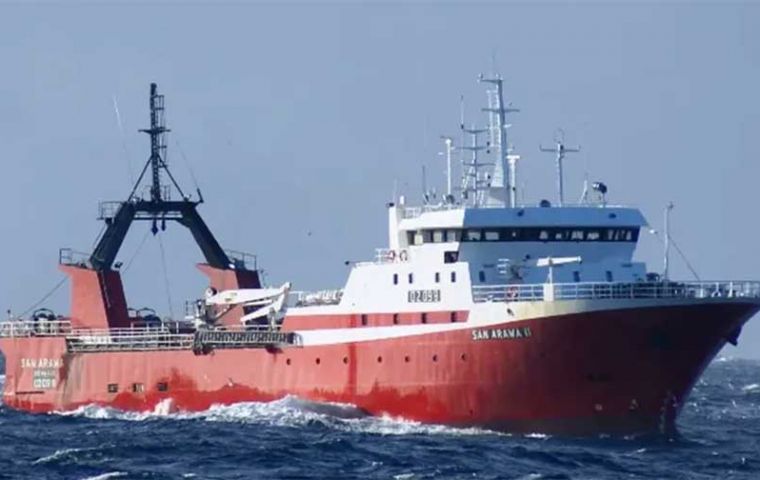MercoPress. South Atlantic News Agency
Argentina dispatches a research cruise on Patagonian toothfish
 The area under research is located between parallels 54 and 55 degrees South and Meridians 61 to 64, West.
The area under research is located between parallels 54 and 55 degrees South and Meridians 61 to 64, West. Argentina has launched a research cruise on Patagonian tooth fish (Dissostichus eleginoides) to collect more information on the reproduction physiology of the species. The fishing factory vessel San Arawa II left Ushuaia with a team of scientists from INIDEP, the Mar del Plata based Fisheries Research and Development Institute, and the cruise is expected to last some three weeks.
The area under research is located between parallels 54 and 55 degrees South and Meridians 61 to 64, West.
Apparently according to the research agenda this area is a rich toothfish fishery, with great yields and the objective is to study reproduction conditions towards the end of the fishing ban.
Likewise other areas of interest are the age structure and the trophic ecology of the species in the extreme south of South America, following on the analysis of stable isotopes, plus submarine filming, to better understand reactions of the species to different fishing gear and trying to identify and quantify benthos.
In related news the Argentine/Uruguayan Mixed Technical Committee, CTMFM, which manages the common fisheries of Argentina and Uruguay in the River Plate, decided to close the Illex Argentinus Squid season to preserve and protect the specie in the strategic area.
This follows a meeting of the Joint Committee stating that beginning September Illex squid extraction is banned looking ahead to the 2025 season and for conservation reasons. The measure intends to ensure the sustainability of the biomass given natural fluctuations, probably because of climate change, but also over fishing.
Apparently in the joint area research has shown a high concentration of juveniles, which if not protected endangers future seasons.
The official release on both sides of the River Plate admits the short term problems for the fishing industry, and necessary readjustments, but also point out that in the long term it is a productive investment for future seasons.




Top Comments
Disclaimer & comment rulesCommenting for this story is now closed.
If you have a Facebook account, become a fan and comment on our Facebook Page!